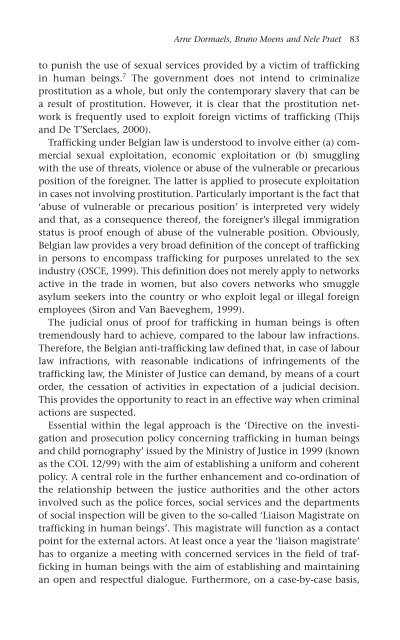3071-The political economy of new slavery
3071-The political economy of new slavery
3071-The political economy of new slavery
You also want an ePaper? Increase the reach of your titles
YUMPU automatically turns print PDFs into web optimized ePapers that Google loves.
Arne Dormaels, Bruno Moens and Nele Praet 83<br />
to punish the use <strong>of</strong> sexual services provided by a victim <strong>of</strong> trafficking<br />
in human beings. 7 <strong>The</strong> government does not intend to criminalize<br />
prostitution as a whole, but only the contemporary <strong>slavery</strong> that can be<br />
a result <strong>of</strong> prostitution. However, it is clear that the prostitution network<br />
is frequently used to exploit foreign victims <strong>of</strong> trafficking (Thijs<br />
and De T’Serclaes, 2000).<br />
Trafficking under Belgian law is understood to involve either (a) commercial<br />
sexual exploitation, economic exploitation or (b) smuggling<br />
with the use <strong>of</strong> threats, violence or abuse <strong>of</strong> the vulnerable or precarious<br />
position <strong>of</strong> the foreigner. <strong>The</strong> latter is applied to prosecute exploitation<br />
in cases not involving prostitution. Particularly important is the fact that<br />
‘abuse <strong>of</strong> vulnerable or precarious position’ is interpreted very widely<br />
and that, as a consequence there<strong>of</strong>, the foreigner’s illegal immigration<br />
status is pro<strong>of</strong> enough <strong>of</strong> abuse <strong>of</strong> the vulnerable position. Obviously,<br />
Belgian law provides a very broad definition <strong>of</strong> the concept <strong>of</strong> trafficking<br />
in persons to encompass trafficking for purposes unrelated to the sex<br />
industry (OSCE, 1999). This definition does not merely apply to networks<br />
active in the trade in women, but also covers networks who smuggle<br />
asylum seekers into the country or who exploit legal or illegal foreign<br />
employees (Siron and Van Baeveghem, 1999).<br />
<strong>The</strong> judicial onus <strong>of</strong> pro<strong>of</strong> for trafficking in human beings is <strong>of</strong>ten<br />
tremendously hard to achieve, compared to the labour law infractions.<br />
<strong>The</strong>refore, the Belgian anti-trafficking law defined that, in case <strong>of</strong> labour<br />
law infractions, with reasonable indications <strong>of</strong> infringements <strong>of</strong> the<br />
trafficking law, the Minister <strong>of</strong> Justice can demand, by means <strong>of</strong> a court<br />
order, the cessation <strong>of</strong> activities in expectation <strong>of</strong> a judicial decision.<br />
This provides the opportunity to react in an effective way when criminal<br />
actions are suspected.<br />
Essential within the legal approach is the ‘Directive on the investigation<br />
and prosecution policy concerning trafficking in human beings<br />
and child pornography’ issued by the Ministry <strong>of</strong> Justice in 1999 (known<br />
as the COL 12/99) with the aim <strong>of</strong> establishing a uniform and coherent<br />
policy. A central role in the further enhancement and co-ordination <strong>of</strong><br />
the relationship between the justice authorities and the other actors<br />
involved such as the police forces, social services and the departments<br />
<strong>of</strong> social inspection will be given to the so-called ‘Liaison Magistrate on<br />
trafficking in human beings’. This magistrate will function as a contact<br />
point for the external actors. At least once a year the ‘liaison magistrate’<br />
has to organize a meeting with concerned services in the field <strong>of</strong> trafficking<br />
in human beings with the aim <strong>of</strong> establishing and maintaining<br />
an open and respectful dialogue. Furthermore, on a case-by-case basis,


